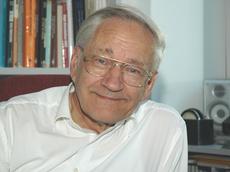Chemistry an opportunity for a sustainable use of nature
Richard Ernst wanted to be a chemist because he hoped it would give him an insight into the basic phenomena of nature. Modern chemistry should, among other things, help solve problems of the energy production and consumption, says the 1991 Nobel-Prize winner.

What do you consider to be
chemistry’s greatest achievement or most important discovery?
Chemistry offers a direct insight into the
basic phenomena of nature and opens up opportunities for us to use it for the
long-term benefit and survival of humankind.
What do you focus on in your
research and what aspects of it are evident or usable in everyday life?
My work concerns the development of physico-chemical measuring methods for exploring and better understanding the phenomena of nature and to find out where the limits of a
tolerable human influence on nature lie. Today, the magnetic resonance
spectroscopy method I co-developed has been put to spectacular use with a
direct benefit for human health in medical magnetic resonance imaging (MRI).
This tool also brings us closer to understanding the highly complex
processes in the active human brain than any other experimental design.
What fascinated you about
chemistry? Why did you want to be a chemist?
I wanted to unlock the secrets of nature and understand its basic
principles. For me, chemistry is the best way to at least get somewhere near to
this goal and the wealth of chemical phenomena is just fascinating.
Which areas of chemistry research
will become particularly important in future and why?
What’s particularly crucial, both today and in
the future, are the questions regarding energy, which are essentially governed by
chemical and physico-chemical processes. Equally important is the manifold of biochemical
aspects of life, nutrition and health.
What concept from chemistry should
everyone know by the end of the International Year of Chemistry and why?
Chemistry is synonymous with a molecular-atomic understanding of natural
phenomena and with the sustainable use of nature, that is necessary for survival on
our planet.
About the person
Seventy-eight-year-old Richard Ernst is an emeritus professor of physical chemistry at ETH Zurich. He was awarded the Nobel Prize for Chemistry in 1991 for his groundbreaking contributions towards the development of high-resolution nuclear magnetic resonance spectroscopy.







READER COMMENTS